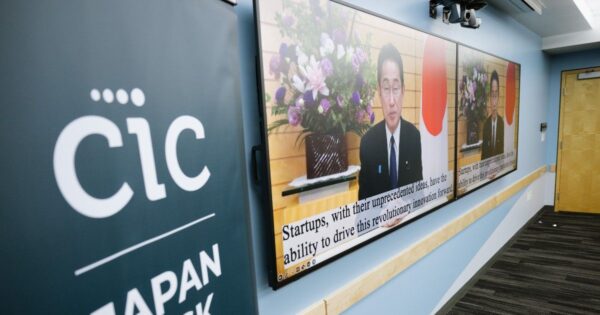Boston maintains a global reputation as an innovation hub. In 2017, Boston was named one of the top ten US cities in terms of startup growth, according to the Kaufmann Index of Entrepreneurship, and ranked as one of the World Economic Forum’s most innovative cities.
So it’s not surprising that Bostonians increasingly turn to coworking as their workspace of choice.
Coworking refers to an office model in which workspace is shared among individuals who work for different organizations or are self-employed — in contrast to traditional work environments where each office corresponds to its own employer. Coworking spaces bring people from various backgrounds and industries under one roof where resources are shared among members.
Coworking centers represent an integral piece of the innovation ecosystem.
Step into one on nearly any day of the week and you’ll find a skillshare, networking event, or hackathon. You’ll find investors hosting pitch nights for startups with scalable technologies; serial entrepreneurs helping rookies work through an obstacle in their business; and freelancers congregating during lunch to socialize as a break from their solitary work.
Entrepreneurs, startups, nonprofits, and corporations alike utilize coworking because it’s one of the best ways to plug into local networks and take advantage of all that Boston has to offer. But all the tricks, hacks, and best opportunities of coworking might not be obvious on day one — or even day one hundred.
These eight tips will ensure that you’re renting more than a desk and using your coworking membership to enrich your career and life to the fullest:
1. Choose a coworking space in a strategic location
It’s not just about what’s inside a coworking space, but also what’s around it. When you think about how your coworking membership will fit into your life, an easy place to start is to consider your commute. Especially if you’re a one-person team or you have the option to work remotely, make sure that the space you pay to be in is one that you’ll enjoy, that will help you get your work done, and that you’ll actually utilize.
Besides the route you will take to get to work, consider the surrounding neighborhood and its amenities. If a nearby gym or a selection of nice lunch spots for a business meeting is important to you, have those preferences on your radar as you’re choosing your new workspace.
At the end of the day, you’re at a coworking space to work, right? So in addition to a setup that will keep you productive and inspired on a personal level, consider a location’s potential to make your business more productive.
Sara Mruz, Community Leader of CIC’s Cambridge Coworking Center, explains the importance of location to her community of entrepreneurs, freelancers, and startups: “We’ve found that being located in the heart of Kendall Square is very helpful for clients. For example, you are closer to top companies, the address legitimizes your business, and meetings are easier to set up when you are in the same neighborhood.”
2. Meet your “coworkers”
The workforce is becoming increasingly decentralized. In 2018, just under four million Americans reported working from home at least half of the week, up 115 percent from 2005. Among remote workers, 55 percent said they telecommute full-time.
At the same time, workers have reported higher rates of loneliness in recent years, which former US Surgeon General Vivek Murthy has called the “loneliness epidemic,” caused in part by the loss of built-in social structures at work.
Studies have shown that coworking helps to combat these feelings of isolation. According to surveys reported in the Harvard Business Review, 79 percent of respondents said that coworking has expanded their social networks, and 83 percent reported feeling less lonely since joining a coworking space.
With many different people sharing space, coworking naturally facilitates socializing and camaraderie among members. If you’re not someone who frequently strikes up conversation with new people, don’t worry. Luckily, coworking spaces commonly have events for members to meet each other and network in various settings.
However, you don’t have to be in the market for new after-work pals or seeking to join your coworking community’s kickball league in order to utilize the network your membership gains you access to. The space you join is likely full of potential collaborators, clients, and investors.
Keep yourself open to conversations with fellow members. Ask them about their interests and their work, and be prepared to talk about yours. Business relationships have the potential to form around the coffee machine, in the hallway, or on your coworking community’s Slack channel.
Check out what Victoria Dew, Boston-based founder & CEO of Dewpoint Communications, has to say about the value of coworking for solo entrepreneurs.
3. Attend events happening in the space
Coworking spaces are hotbeds of activity where you’ll find events ranging from social to professional. Some of these may be open to the public, whereas others might be specifically for members of that space. Keep an eye on your in-house events calendar, as you might be surprised by how many events are relevant to the work you do, putting you in touch with like-minded individuals and peers who are inevitably facing some of the same challenges in their work as you are.
“Best case scenario, you may learn something crucial to help grow your business, meet your cofounder, or get funding for your venture,” says Pam Fraher, Strategic Director of Events – North America at CIC. “Worse case, maybe just stepping away from your work for a moment will help get those creative juices flowing later.”
Boston in particular is rich with events specifically curated for entrepreneurs to help you grow your business. “The startup community in Boston is so supportive,” Fraher says, “that other entrepreneurs want to share their wisdom with you.” There’s almost no easier way to get your name on the attending list than to work out of the spaces that host much of this programming. Bonus: tons of events at coworking spaces are free or discounted for members.
If you’re not someone who thrives on meeting a hundred new people on a given night — let’s face it, most of us don’t wake up in the morning and think how fun it would be to network today — try looking for smaller events or interactive workshops with more built-in engagement. Consider reaching out to a venue for recommendations if you’re not sure which events would be the best fit for you.
After an event, make sure to follow up with the people you met. Fraher’s advice for how to tackle this: “Following up can be low-key, like adding someone on LinkedIn, or more intentional, like sending an email,” she says. “Consider what you can offer others instead of what you can get from them. By being generous with your time, your network will grow in a more valuable way, and then when you really need some extra support, you’ll have no trouble finding it.”
4. Ask about perks and benefits
At some coworking spaces, the benefits of membership extend beyond the time spent in the office. Because of their volume of members, coworking companies can negotiate corporate discounts to pass onto their individual clients. This can be anything from reduced hotel rates to free gym passes to discounts on business tools like Amazon Web Services.
Every coworking company has unique offerings, so make sure to ask their staff what discounts and benefits are available to you as a member.
Member benefits can also be useful in getting your company’s name out and reaching new customers. If your coworking space offers discounts for members, inquire about making your company’s product or services available to fellow members with a free trial or at a reduced rate.
While you’re at it, you can also consider reaching out to coworking spaces besides your own to offer similar promotions. With these workspaces housing dozens to thousands of people each, setting up an arrangement with an individual company that rents space to other companies can gain you access to a huge audience.
5. Utilize support staff
Coworking support staff have immense knowledge about the workspace’s features, amenities, member benefits, events, and culture.
Cambridge Coworking Center community leader Sara Mruz always suggests that someone new to a coworking community meet support staff upon getting started. “Your support team will be your most helpful resource right out of the gate for answering questions and directing you to the right place,” she says. “We are also able to make introductions and connections based on what you’re working on or interested in.”
In-person staff can also be a great resource for finding out about events and the array of member benefits we discussed above. According to Mruz, “Community member benefits are often an unexpected and welcome surprise for members, as well as many events happening both in the coworking space and the city.” The earlier you ask questions, the sooner you can reap the benefits of what you’re paying for.
It’s literally the job of support staff to make sure the space is as conducive as possible to your comfort and productivity, whether that’s troubleshooting a video conferencing setup or getting you acquainted with the details of your membership. Know who to look for and where to find them so that you can get more done faster and take full advantage of what the space and its community have to offer.
6. Tap into a network of spaces
Let’s say you live and work in Boston but you travel to Philadelphia quarterly for business. Or your family has planned a trip to Florida this winter, but with impending deadlines, you have to get some work done while you’re on the road.
While you might have forced yourself to make do with hotel rooms or coffee shops in the past, be sure to find out if your coworking space has locations in other cities that you can use when you’re away from home. You may be able to do so without any extra charge, and you’ll then have access to all the same workspaces and amenities that you value in your home base.
If you can’t find this information on their website, try contacting the coworking space directly or check in with support staff where you work.
Especially for people who travel frequently, the company’s other locations besides the one where you sign up for your membership can transform the way you work. If you haven’t yet signed up for a membership or you’re currently weighing your other options, map out your geographical needs against the coworking space’s regional, national, or international footprint.
This is another instance where the community aspect of coworking comes into play. Even if you don’t need on-the-go office options in other places, the fact that your coworking space maintains locations in Tokyo or Rotterdam automatically brings you into closer contact with individuals and companies who have memberships in those cities.
Your coworking community might have its own social media platform or internal network for members to connect, or at the very least, support staff might be able to make connections for you within your industry across sites. Look for ways to tap into this network outside of your own office.
7. Find a like-minded or industry-specific community
The coworking experience is all about harnessing the power of people coming together — rather than remaining siloed — to work more efficiently, collaboratively, and enjoyably. To take it a step further, some coworking communities center themselves around common goals, industries, or specialized areas of work.
The unique camaraderie and collective expertise of themed coworking spaces translates to a value-add for members who can exchange ideas, be inspired, and productively build relationships with people who really understand what you do and can help you move closer to your goals (and vice versa).
Due to Boston’s rich and well-utilized coworking landscape, you can now find a diversity of industry-specific spaces here tailored to your needs and preferences. For instance, MassRobotics in the Seaport District works with — yup, you guessed it — robotics companies, while Greentown Labs in Somerville specializes in clean energy technology and Make Shift Boston caters to social justice-oriented artists and activists.
“It’s a question of how can you be a smarter worker,” says Lauren Abda, founder of Branchfood, a community of Boston area food entrepreneurs. “Launching a business is really hard and we only have so many hours in the day, so what can you do to improve your chances of success?”
Abda’s answer to this is Branchfood’s coworking space in downtown Boston, where startups, corporations, and investors in the food industry can work alongside one another. “Industry-specific coworking allows you to surround yourself with the most relevant community, locate your business in a convenient place, and get connected with the best resources to support your efforts,” she says.
8. Host your own events
Coworking spaces are buzzing with events for you to attend, but you can further utilize this infrastructure to host your own events. In turn, you’ll create an opportunity to network, share your expertise, and develop your brand.
To make sure your event is a successful one, Pam Fraher, CIC’s Strategic Director of Events for North America, suggests you start by checking for upcoming events around a similar topic and date as yours. If you find overlap, consider reaching out to the other event to team up. You don’t want to risk losing attendance due to a competing event.
Fraher recommends starting your event planning two to three months in advance. “This gives you time to solidify content and effectively market your event,” she explains.
We don’t all have professional event planning experience, so don’t be shy in asking for help. You might ask hosts at events you attend for some tips. Coworking staff can also be immensely useful if you have questions about parts of the event process. The coworking center might even have dedicated event staff who can help you brainstorm content, format, and promotional strategies.
CONCLUSION
Coworking continues to grow in popularity in Boston, in part because of its convenience. It’s a good fit for an increasingly remote and gig-based economy. But more than that, coworking spaces are community spaces that foster connection and collaboration powerful enough to transform entire industries.
No longer is coworking just about having an affordable desk away from home; organizations of all sizes use it to encourage forward-thinking work styles and cultures.
Although coworking can help you grow your business and enjoy both your work and non-work life, it’s up to you how you use it. CIC’s Sara Mruz put it best: “Coworking spaces operate under the philosophy that you get out of it what you put into it.”
The eight tips we covered here ensure that you know exactly what to do to maximize what you get out of coworking.








